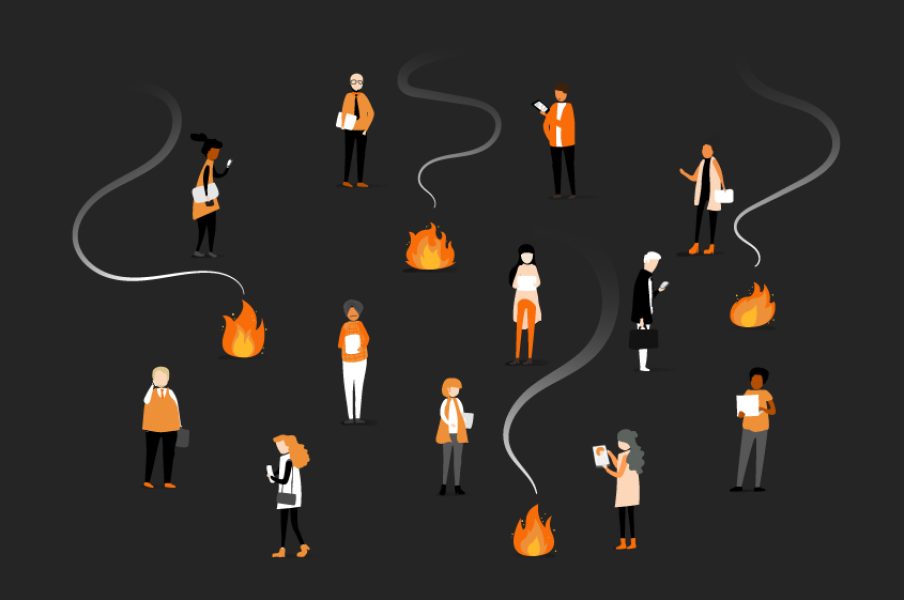It’s no secret COVID-19 has added many stressors to our daily lives. With lockdowns, social distancing, and vaccinations weighing heavily on people’s minds, one comfort of this whole crisis was the shift to working from home. However, after a year of this supposed relief from the office, some of us are experiencing the dreaded burnout creeping back into our lives. If you’ve been feeling more emotionally and physically exhausted than usual, you may have it. Working from home is a huge mountain to cross for some people.
What is Burnout?
The World Health Organization includes burnout in the 11th Revision of the International Classification of Diseases (ICD-11). Burnout is defined as a state of chronic stress that leads to a combination of severe physical and mental exhaustion, reducing professional effectiveness.
Research has found that burnout emerges when job demands outweigh an individual’s ability to cope with stress. A job environment consisting of high demands, low control, and an effort/reward imbalance is at significant risk for sending its employees into complete physical, mental, and emotional exhaustion.
What does burnout actually look like while working from home?
These are the main components that characterize burnout defined by the World Health Organization. These symptoms should be seen as on a continuum, meaning stress can turn into total burnout.
Fatigue
This can be feeling exceptionally tired throughout the day, physically and mentally. It can be draining to begin the day and even more tiring to carry on work throughout the day. If getting up in the morning is becoming more demanding than expected, you may be on your way to being burnt out.
Insomnia
You may also experience trouble falling asleep and staying asleep. If the overwhelming pressure wasn’t tiring enough, the limited sleep will most likely increase stress and decrease productivity.
Difficulty concentrating
Trouble concentrating on tasks or simply forgetting to complete tasks is another sign of burnout. Loss of concentration can cause work to pile up, worsening the symptoms of burnout.
Physical Problems
Since your body becomes so depleted physically and mentally from burnout, you can often see physical symptoms (like gastrointestinal problems, chest pain, headaches) or increased illnesses (like flu, colds, or other immune issues).
Change in Diet
Burnout can cause fluctuations in the diet. In some cases, you will eat more than usual in order to relax- indulging in food can become a coping mechanism. On the other hand, you can experience a loss in appetite resulting in significant weight loss.
Anxiety
You may experience worry and tension. The feeling of having no control over your job or workload can worsen anxiety and decrease productivity, causing work to pile up.
Burnout can sometimes be difficult to recognize. The symptoms of burnout often manifest in the same way depression does. If you’re wondering if you’ve succumbed to burnout, consider these questions for yourself:
- Have you been experiencing headaches, muscle aches, or any physical problems?
- Do you get sick frequently?
- Do you find yourself having an overall negative attitude at work?
- Do you feel overwhelmed at work?
- Do you have trouble starting and completing tasks at work?
- Are you having trouble falling asleep or staying asleep?
- Has your diet changed? Have you been using drugs or alcohol to feel better about work or numb your feelings?
- Have you been more irritable at work with customers or coworkers?
If you answered yes to any of these questions, you could be experiencing the dreaded burnout. Of course, there could be other explanations for these symptoms by working from home, but if you find these are present when at work or while thinking about work, it could be an indicator. It’s always important to see your doctor or mental health provider to rule out other possible conditions.
We know burnout occurs when job demands outweigh an individual’s ability to cope with stress, so we must find effective ways to manage the stress or beat the stress before it even starts.
Practice self-care.
By taking the time to refuel from the mental and physical strains of the workday, your mind and body will be able to handle small doses of stress by working from home. Ensure you are getting enough sleep, keeping up a nutritious diet, keeping a solid social support system, and participating in activities you enjoy like going on walks outside, drawing, cooking, etc.
Facilitate communication.
Stress at work is inevitable. By keeping a line of communication between yourself and the managers, you can keep them aware of what is happening on the company’s front lines. If a goal is unreasonable, tell someone. If a client is asking for something not attainable, tell someone.
If you are not sure how to correctly complete a task by working from home, tell someone. Sometimes it just takes someone speaking up to facilitate change, and you might not be the only one experiencing that problem needing to be addressed.











